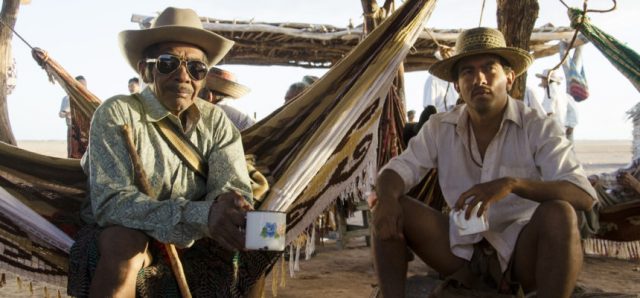Birds of Passage: Clear Path, by Scott Nye

Ciro Guerra made a huge splash with his excellent 2015 film Embrace of the Serpent, a hallucinatory epic of colonial history that was at turns tragic and hilarious, meditative and beautiful. His new film, which he co-directed with Serpent producer Cristina Gallego, has several of the same hallmarks as Serpent – a certain dry, cutting humor; patience in building out its story and setting; vibrant cinematography. As soon as it gets to the main plot, despite its cultural specificity, it can’t help but feel like it’s on a very specific trajectory from which it cannot deviate.
The film chronicles two families in the native Wayuu tribe of Colombia. Rapayet (José Acosta) is poor, but becomes entranced by Zaida (Natalia Reyes) during the traditional ceremony for her coming-of-age. Draped in explosive colors that flow with the wind as she dances, no man can quite keep up with her movement, until Rapayet steps in, and an instant connection is forged. Determined to marry her, he goes to her mother Úrsula (Carmiña Martínez), who says, sure, marry my daughter you peasant – just bring me more cows, goats, and jewelry than you’ve ever possessed or will ever possess in your life.
Rapayet is pretty down about this, until he gets word that some American Peace Corps volunteers maybe aren’t so pure of heart and maybe just want to hang out and get high, and wouldn’t you know it, Rapayet has a cousin whose property is overflowing with marijuana. Wayuu tradition forbids such sales, but Wayuu tradition is keeping him pretty poor at the moment, and anyway nobody has to know. The plan succeeds and he marries Zaida, and perhaps with an eye toward their future together, Rapayet is at least a little receptive to another member of the Corps’s interest in expanding the business relationship beyond a one-off sale.
The remaining tension of the film comes from familiar places. Rapayet and his team get in over their heads, alliances are formed and broken, some people yearn for too much power, and the traditions of the Wayuu necessarily clash with criminal capitalist drug trade. The film’s overall point, that greed and Western influence urged the native people to abandon their past and in the process ruined themselves, is one I’m sympathetic to and agree with, but it’s such well worn territory that aside from the change of scenery, there isn’t a lot to invest in.
Guerra, Gallego, and their cast and crew seem to have invested deeply in the Wayuu culture. I’m no expert, of course; the results simply feel lived-in and expansive, the aspects of it that we do understand (that Zaida had been in literal confinement before her coming out party, learning how to be a proper woman; that relationships between tribes are a bit strained but held together through communications via word messengers) help to distinguish it. They don’t go out of their way to explain the culture, just trickling it in as the story starts to draw it out. Sometimes they go a little overboard, having characters state “don’t know you, Wayuu tradition dictates that _____” to characters who very clearly know exactly what Wayuu tradition dictates. For the most part these statements seem like affirmations made in vain past the point where the line would already be crossed. They are the last hope of people who know very well what’s been lost, and where they’re headed.
The film takes place over about fifteen years, and the actors – Acosta and Martínez especially – develop their characters in believable ways, anchoring them to core tendencies while keeping them malleable as their immediate circumstances get much more lavish while the danger just outside this world mounts. Acosta’s sense of purpose and focus is clear from the start, the moment he meets Zaida, and that sticks with him through the years, pushing aside friends and family who are not as dedicated and principled as he. It makes him a bit of an opaque protagonist, but by the time he’s left alone in the desert awaiting inevitable death, his relationship to the camera clarifies. Where before he owned his space, now he seems to shrink from it.
Despite these fine touches, it’s hard to escape the scenario’s essential limitations when the entire film is mapped before you so early on. It’s more than just predictable plot; it starts to feel like a closed-off view of the world, that despite taking place among an underrepresented people, its vision of humanity’s essential faults and virtues stretches only so far, cutting out what will not fit its narrative mission.


























